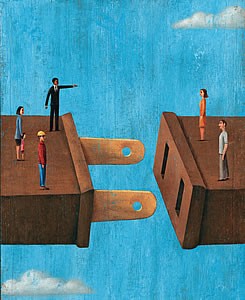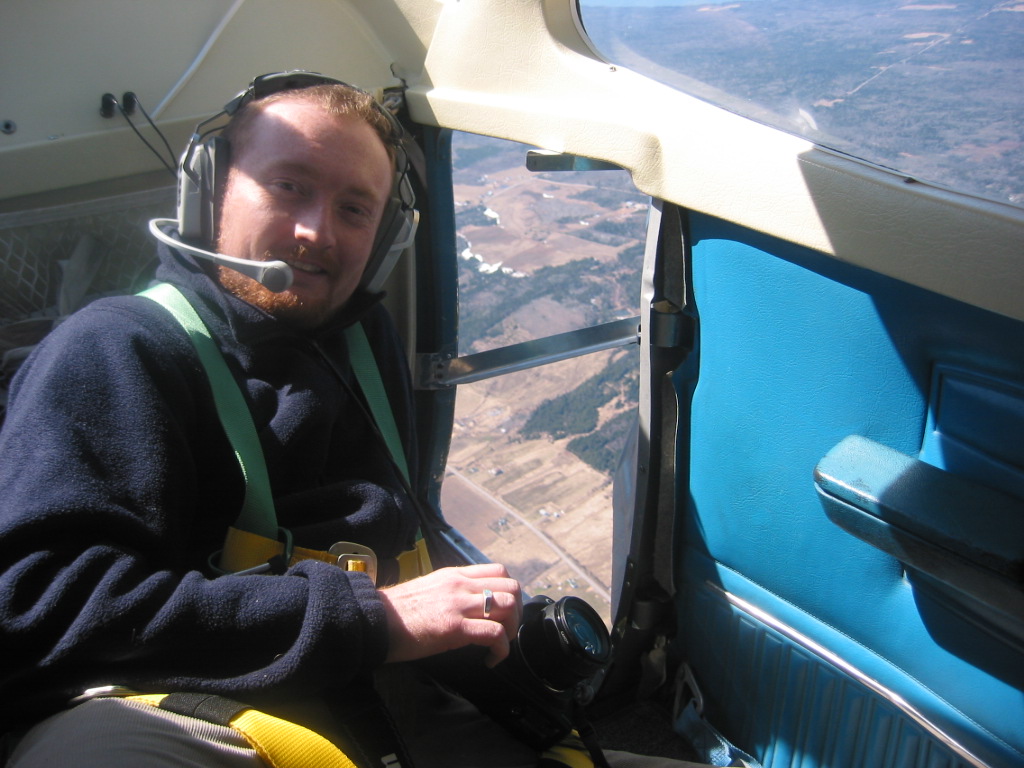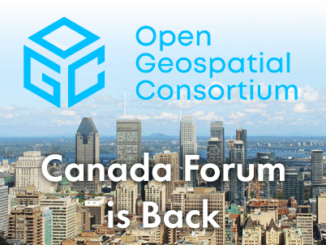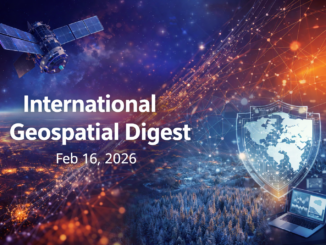
On March 15-16th the GeoAlliance is hosting a strategy event in Calgary you can see here. They are trying to bring together members of the Canadian geomatics community to develop a “Roadmap.” GoGeomatics, like many other groups can’t attend, so I am posting this piece to serve as our positive contribution to the process. My hope is it will be read by those in attendance and that some of these ideas and suggestions will be considered.
First off I want to say that “what” the GeoAlliance does is as important as “how” they do it. It’s not not enough to have a list of worthy projects or goals, but whatever the GeoAlliance does the “how” of it must be planned, communicated, and implemented to the highest possible standards. It’s not clear from the event materials if they are only looking for input on projects or on everything they do, so my comments are wide-ranging.
First we should understand what the GeoAlliance was meant to be and what it was not meant to be. This is based on my own deep knowledge of the project as a volunteer and a contractor for NRCan helping to develop the GeoAlliance from it’s early days as the CGCRT.
The GeoAlliance was not created to replace existing groups or duplicate services and activities that are already successful in the Canadian geomatics community. This is reflected in the fact the group is not open to individual membership, only organisational membership. There is no push to replace existing organisations, or even compete with them. If this was something that was attempted, lets say by starting another Remote Sensing group or another GANS this would be the equivalent of the GeoAlliance eating it’s young. We already have groups that meet those mandates. No one should be worried about the GeoAlliance stepping on anyone’s toes. So that’s what they are not doing. This begs the question: What should they be doing?
The GeoAlliance is meant to fill in the leadership gaps and coordinate (if possible) between the players in our sector. These players being governments, schools, businesses, and non-profits. The GeoAlliance, as envisioned by the CGCRT, should build bridges in the Canadian geomatics community by tying us together under an umbrella. As well the CGCRT saw the project that would become the GeoAllaince as something that should strengthen and empower existing organisations.
Now the umbrella has been formed the GeoAlliance should push out from our own sector and foster connections with other sectors, thus building those bridges as well. (Editors note – maybe a bridge should be part of a new logo?) We should start reaching out to the myriad of other sectors in Canada and eventually the world. There are some that will disagree with me of course. I’m discussing the aims of the CGCRT in the broadest possible strokes for brevity’s sake.
Many things are now possible because the GeoAlliance has received monies (editors note- hundreds of thousands of dollars – oh my!) from NRCan. These funds will allow the group to hire staff and fund projects. The suggestions below go beyond individual projects but also look at how the organisation should be managed and to what standards it should aspire to.
What the GeoAlliance Needs to be Successful:
Executive Leadership:
The new organisation will need paid professional staff to be successful. Leading this staff should be an executive director who can not only communicate in two official languages, but who can carry out the vision and mandate of the organization. We need someone who has a track record of taking the goals and vision of an organisation and making them real. No talking heads please, “doers” only. We should seek out an Exec Dir to be with real gravitas and managerial abilities. In fact all of the staff should be made up of professionals of the same ilk. I do have some very interesting candidates in mind but I will be discrete and not publish them here. No, I don’t mean me.
Transparency & Open Governance:
As the GeoAlliance is a community project and funded in large part through our Canadian tax dollars, it would behoove the organisation to make it’s meetings, minutes, finances, and activities public. Not just available to the members mind you, but the public at large. All of us. After all, don’t they aspire to lead all of us?
There are many good reasons for transparency in community organisations, but I believe it has been a lack of transparency which has allowed some groups in the Canadian geomatics community (overseas as well) to wither unnoticed. Groups not with us today might still be if alarm bells had sounded earlier on issues relating to membership and funding. So to avoid this, I put transparency and openness near the top of my proposals.
Accountability & Reporting:
The members of the GeoAlliance, and I would hope the wider geomatics community, should participate in a grading of the GeoAlliance each year. There are many ways we could do this, but how about grades like we used to get in school? We could do “F” through “A+.” Each year, we the community, would get to let the GeoAlliance know how we think they are doing. Here are some suggested categories (which ones would you suggest?):
- Community Leadership
- Communications
- Finances
- Management
- Projects
- Service to Member organisations
- Lobbying
- Transparency
- Accountability
Part of being accountable is being open to criticism. We need to have an organisation with a leadership that is receptive to criticism and discussion. I would argue strongly that nothing is as fragile or tenuous as an organisation that can’t adapt to change or critique.
Professional Communications:
Going forward all of the communications from the GeoAlliance must be done in a timely and professional manner. I point towards the “Roadmap” event as an example of a missed opportunity. This event should have been communicated with a full agenda months before hand. It’s only recently any substantive agenda was distributed or speakers lined up. The event could have been much more than another strategy session. We have had quite a few of those already.
Another aspect of the event that needs some critique is the lack of channels for input into the “Roadmap.” As far as we can see the only way to participate is to fly to Calgary and go to the event. You could not have planned a better way of excluding whole swaths of the geomatics community from giving input. Many organisations simply can’t afford the time or the money to give input this way. I have an idea to make future activities much more open and inclusive.
Why not provide a live web feed so the community can at least see what is happening at the event? “Live Tweeting” an event is no substitute for web streaming. Streaming an event is easy to do and has very little cost. It’s also pretty easy to take input online from those at working remotely.
I’m pointing out all the above to emphasize the GeoAlliance should raise it’s standards by hiring at least one bilingual professional communication specialist for the organisation. Not just someone in that role as a placeholder, but someone with at least 10 years experience in marketing and communications. Let us raise the bar! The Canadian geomatics community deserves better.
Financial Viability:
How do we fund the GeoAlliance? That was one of the most difficult questions faced by the CGCRT (other than the name – see more here). Last year it was decided a flat fee of $1,500 per organisation, big or small, would be the cost of admission. The price goes up as well. With the small number of members who have joined thus far the membership dues alone will not be enough to float this organisation from year to year. Unless NRCan continues to lavish funds on the GeoAlliance there will simply not enough money to keep funding the group to the levels needed. One of the ways that funding could be stabilized is by opening up membership to organisations that can’t afford the $1,500 price tag but could afford less. As well much larger organisations could be paying more. A sliding scale is essential in order to allow groups large and small a chance to be members and pay their fair share.
Let’s Spend Some of that NRCan Money! GeoAlliance Projects & Services
Canada Should Host A Location Technology Showcase:
Here is a link to an article for a project that I suggested some time ago. I submit it again for consideration. As you can see I’ve been thinking and working on issues relating to the geomatics industry in Canada for some years now. This is one of my bigger ideas.
Picture this: 20,000 people flocking to the location technology event of the world every two years, hosted right here in Canada. I’m proposing that Canada become the top destination for the world’s biggest showcase of location technology. This would not be an academic conference. This would be a global showcase of the world’s leading innovative location technologies. An event like this would also be a source of much needed revenue.
Capacity Building and Leadership Services:
One of the most important things that GeoAlliance can do is help raise the bar for all the member organisations by providing yearly workshops. I envision a set of annual workshops where staff, executives, and board members can come together and learn. The focus of some of the workshops should be:
– Communications training
– Strategy development
– Development of member centered services
– Proposal writing for grants & contracts
– Conference and event planning
– New services & product development
– Leadership training
By providing a workshop(s) to member organizations and getting them together in one place this will allow them get value for the membership dues they pay. This provides a real impetus for joining the GeoAlliance where none exists now. Essentially what I am suggesting is teach those skills that help organisations meet their mandates and they will love you for it and pay for it. These workshops could also include fees for participation based on membership level. The possibilities are endless in terms of revenue generating activities that no one is providing to the community at the moment.
I have outlined two possible projects that would not only generate revenue but help strengthen the geomatics community. There are already many more of these type of my ideas are actually within the CGCRT geomatics strategy. I wanted to highlight these two as ones I feel will add the most value right now to the GeoAlliance. As someone who has spent the last 6 years living and breathing the Canadian geomatics community I have many ideas that might serve. The two above are just a start but many more ideas can be found from myself and others in the CGCRT strategy documents.
Final Thoughts:
The GeoAlliance needs to help reinforce and build on what is working within our geomatics community. I point out the track record of success that is GoGeomatics Canada. Our job board, magazine, consulting services, and our networking socials are examples of what is working within the community. We are now the largest and most popular networking community for geomatics in Canada. We have helped thousands of students and young geomatics professionals connect with geomatics entrepreneurs and organisations from coast to coast. That big pot of money the NRCan gave the GeoAlliance is very tempting. Some might try to use it to reinvent the wheel. We must avoid the temptation to reinvent the wheel. We should all support what is working and thriving in our community and use the new opportunity that is the GeoAlliance to build what is missing. Let’s work on the gaps.
What to do when the NRCan Money Dries up?
Those who fail to learn from history are doomed to repeat it. The GeoAlliance only need look to the experiences of other groups in our community which relied too heavily on NRCan for base funding from year to year. We can’t make the same mistake again. We must think towards those activities and models that will ensure the financial viability of the GeoAllaince in the long term. That should be front and centre at the “Roadmap” event in Calgary.
I hope that these words can add to discussion and help the GeoAlliance become a success. We are always stronger when we work, talk, and disagree, – yes, even disagree, together as a community. I’ve not been able to talk about everything I am passionate about here, but I hope I’ve stirred some interest. GoGeomatics Canada will continue to do the things we have always done successfully, now and in the future. One of those things is writing about all the goings on in our corner of what is a worldwide geomatics community. From all of us at GoGeomatics Canada to you the GeoAlliance – best of luck. Your success is all our success.






Be the first to comment